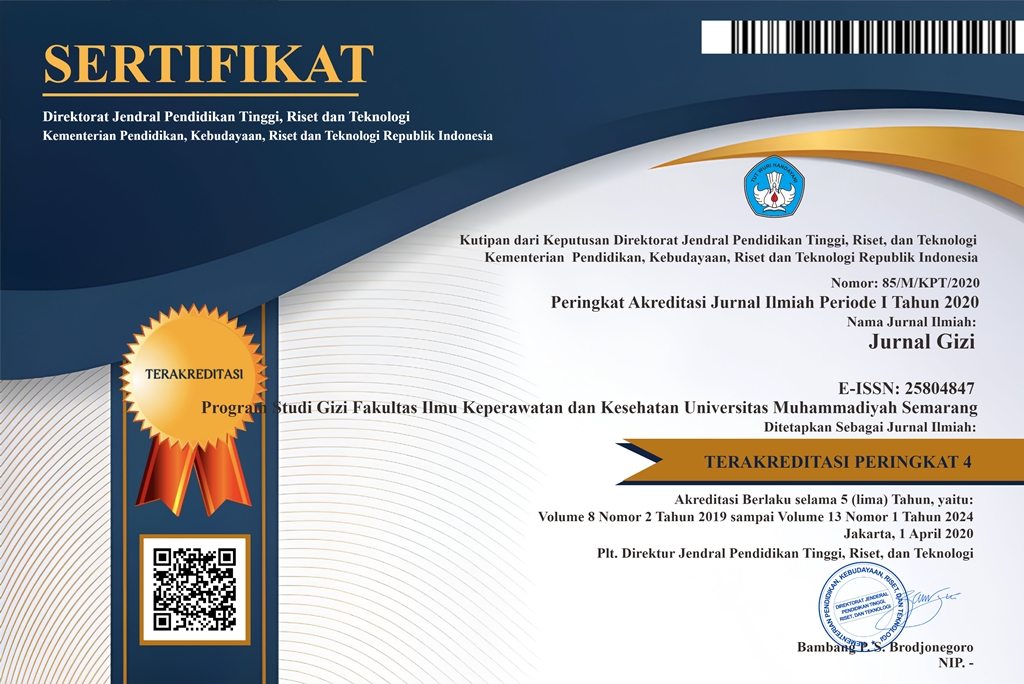Hubungan Tingkat Depresi dengan Asupan Energi dan Protein Pasien Depresi Rawat Inap di Rumah Sakit Jiwa Daerah Dr Amino Gondohutomo Semarang
(1)
(2)
(3)
(*) Corresponding Author
Abstract
Depression is a mental disorder caused by severe disappointments such as death,
divorce, concerns, bankruptcy, death of a loved one is very marked symptoms of sadness, despair , loss of joy , fatigue and tiredness, lack of appetite , weight loss. In a state of depression decreased appetite, which could interfere with the absorption of nutrients into the body, especially the intake of energy and protein. Total case of depression is estimated over 150 million people. Based on a report in 2012 at the Regional Mental Hospital Dr. Amino Gondohutomo contained 5.86 % of 3821 inpatients suffering from depression . The purpose of the study was to determine the relationship of depression with levels of energy and protein
intake depressed patients hospitalized in the Regional Mental Hospital Dr. Amino
Gondohutomo Semarang This type of research is explanatory research, the research that explains the relationship between two or more variables studied . The method used was a cross-sectional , where the variables studied in the same time. Population of the study is that depressed patients hospitalized on 20 April to 20 June 2013 in the Regional Mental Hospital Dr. Amino Gondohutomo criteria Semarang aged 16 years and older. Samples were taken in non probability
sampling technique with Consecutive Sampling. The results showed as many as 50
% of depressed patients have both energy intake and 56.7 % of depressed patients have good protein intake. Data analysis using chisqure test result that
the p - value (0.713 and 0.785)> 0:05 so that Ho is accepted it means there is no relationship between the level of depression with the energy and protein intake. This research should be developed further by adding other variables such as nutritional status or the duration of treatment.
Keywords: Depression levels, energy intake, protein intake.
divorce, concerns, bankruptcy, death of a loved one is very marked symptoms of sadness, despair , loss of joy , fatigue and tiredness, lack of appetite , weight loss. In a state of depression decreased appetite, which could interfere with the absorption of nutrients into the body, especially the intake of energy and protein. Total case of depression is estimated over 150 million people. Based on a report in 2012 at the Regional Mental Hospital Dr. Amino Gondohutomo contained 5.86 % of 3821 inpatients suffering from depression . The purpose of the study was to determine the relationship of depression with levels of energy and protein
intake depressed patients hospitalized in the Regional Mental Hospital Dr. Amino
Gondohutomo Semarang This type of research is explanatory research, the research that explains the relationship between two or more variables studied . The method used was a cross-sectional , where the variables studied in the same time. Population of the study is that depressed patients hospitalized on 20 April to 20 June 2013 in the Regional Mental Hospital Dr. Amino Gondohutomo criteria Semarang aged 16 years and older. Samples were taken in non probability
sampling technique with Consecutive Sampling. The results showed as many as 50
% of depressed patients have both energy intake and 56.7 % of depressed patients have good protein intake. Data analysis using chisqure test result that
the p - value (0.713 and 0.785)> 0:05 so that Ho is accepted it means there is no relationship between the level of depression with the energy and protein intake. This research should be developed further by adding other variables such as nutritional status or the duration of treatment.
Keywords: Depression levels, energy intake, protein intake.
Full Text:
PDFArticle Metrics
Abstract view : 984 timesPDF - 392 times
DOI: https://doi.org/10.26714/jg.2.2.2013.%25p
Refbacks
- There are currently no refbacks.
Diterbitkan oleh: Program Studi Gizi (D3 dan S1)
Fakultas Ilmu Keperawatan dan Kesehatan
Universitas Muhammadiyah Semarang
Sekretariat: Jl. Kedungmundu Raya No. 18 Semarang
Contact Person : Hapsari Sulistya Kusuma, S.Gz, M.Si (+62 85 6 41 536 553)

This work is licensed under a Creative Commons Attribution 4.0 International License.









.png)
.png)